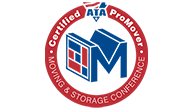Even if you are moving into the home of your dreams, the actual process of moving can be quite stressful. But if you follow the below guidelines, you will feel much more prepared come moving day.
First and foremost, call Reliable Van & Storage for your free in-home estimate. If you plan on doing all or some of your own packing, a Reliable representative will be pleased to provide you with free boxes and other packing materials. And don’t worry, our agency will accommodate you with any special items (like pianos or pool tables), as well as special packing and storage needs.
4-6 weeks before moving day:- Create a master list of everything you need to do, and keep it handy to jot down things that occur to you in the coming days. Make note of special tasks like sending change of address forms out, and cancelling newspapers and utilities.
- Clean out your closets, drawers, cupboards, chests, shelves, garage, attic, and basement. Divide your belongings into four groups: throw away, recycling, giveaway/yard sale, keep.
- Send out change-of-address forms to magazines and other correspondents. Make arrangements to have your mail forwarded to your new address starting on the day you move into your new home. Begin changing over your driver’s license and registration, passport, health cards, and other official forms.
- Notify your utility, cable company, alarm company, lawn service company, and other service providers of your moving dates.
- Plan to use up as much of your food as possible, especially frozen items.
- Call your insurance company to set up insurance for your new home and cancel your old policy on moving day.
- Research schools in your new neighborhood and register your kids there.
- Have upholstery and rugs cleaned; booked window and eaves trough cleaning services.
- If you are doing some (or all) of your own packing, get started on the things you don’t need and store the boxes a convenient but less central place like your den or family room. If possible, don’t store them in your basement. This speeds up the process on moving day because the crews have fewer steps to navigate.
- If you can, visit your new home and make note of any special issues for the movers, such as narrow hallways or steep or winding staircases.
- Keep records of all your moving expenses; in many cases, you can deduct them on your income taxes.
- Make sure appliances are in good working order and make any repairs agreed upon in your house sale.
- Defrost (if necessary) and clean out refrigerator, and clean oven. If you have a wood fireplace, have the chimney cleaned.
- Start cleaning your home as much as you can to minimize this task on moving day.
- If you have decided to pack all or some of your own items, finish this process. Make sure that all boxes are clearly labeled and note which rooms they belong to. Don’t pack the essentials that you’ll need right before and after your move.
- Arrange to have pets and small children spend moving day with a sitter.
- Start to plan for changes to your new home, like booing painters and contractors.
- Make sure arrangements have been made to ensure a smooth handover of keys to both the old house and the new house on moving day; usually these are given to the buyers’ and sellers’ lawyers.
- Pack sheets and pillows in a dresser drawer, for easy access on your first night in your new home.
- Pack a special box with essentials such as toiletries, pajamas, a change of clothing food and serving utensils, and anything else that you may need on the first night. Be sure important documents, including real estate documents and moving-related documents are readily accessible and safe.
- Get a cashier's check for the movers, if necessary. Withdraw cash for the tip.
- Compare our inventory with yours to ensure that nothing has been left out. Plan to be there while our crew is loading, in case we need to discuss with you any unforeseen circumstances.
- Once the old house is empty, o any final cleaning. Walk through all rooms, ensuring that nothing has been left behind. Make sure all the windows are locked and all the lights are turned off. If you have a yard, check that as well.
- Turn the thermostat down to 15 degrees and turn off water heater.
- Check to make sure appliances, furnace, hot water heater, and air conditioning unit in the new house (and anything else specified in the buyer’s agreement) is in good order; notify your real estate agent if anything is amiss.
Subscribe to Reliable Van And Storage's Blog













Comments